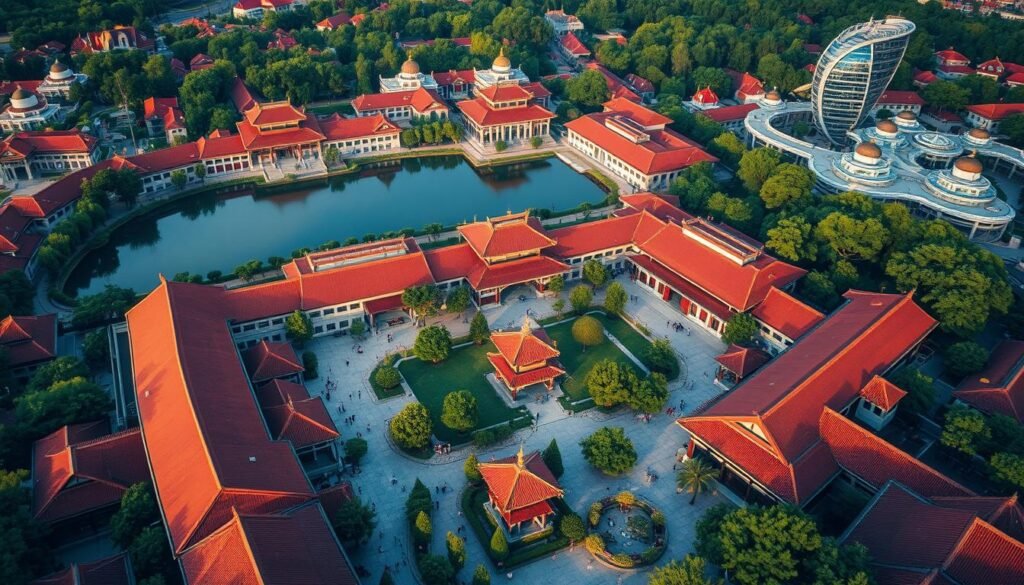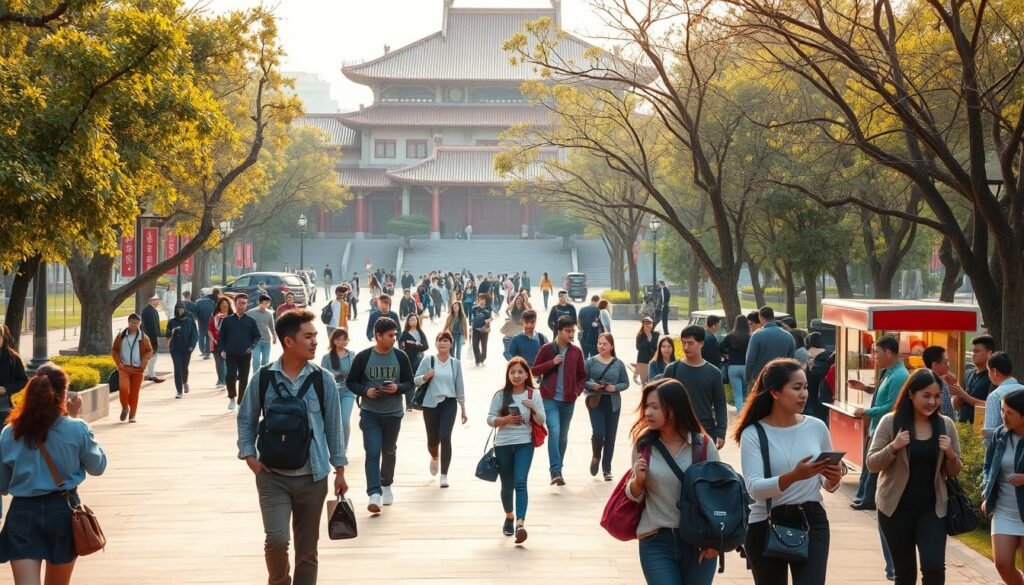Have you ever considered unlocking global opportunities while immersing yourself in a rich cultural experience? China has become a top destination for students worldwide, offering prestigious universities, affordable education, and unique scholarship programs.
With over 30+ programs ranging from language courses to engineering degrees, the country provides diverse academic pathways. Many students benefit from fully funded scholarships covering tuition, accommodation, and even monthly stipends.
Beyond academics, mastering the Chinese language opens doors to career growth. Whether you aim for an MBBS degree or a tech-focused program, this guide simplifies the process—from applications to cultural adaptation.
Key Takeaways
- China hosts 18 globally ranked universities with diverse programs.
- Scholarships often cover tuition, housing, and living expenses.
- Mandarin immersion enhances career prospects worldwide.
- Over 30 academic fields are available, including medicine and engineering.
- Cultural integration strategies ease the transition for international students.
Why Study in China?
China’s universities rank among the best globally—here’s why. With seven institutions in the QS World University Rankings’ top 100, they rival Ivy League schools in research and innovation. Employers like Microsoft China prioritize graduates from elite C9 League schools, known for rigorous STEM programs.
Global Recognition and Opportunities
Peking and Tsinghua Universities boast a 94% employment rate for international graduates. Degrees from these institutions open doors worldwide, especially in tech hubs like Shenzhen, where AI jobs grow 15% yearly.
Language and Cultural Advantages
Mandarin fluency increases earning potential by 27% in Asia-Pacific markets. Homestays in Kunming or calligraphy workshops offer immersive ways to master the language alongside 1.3 billion native speakers.
Future-Proof Careers
From AI to green energy, China leads in emerging industries. International students gain hands-on experience through university partnerships with companies like Alibaba and Huawei.
Types of Programs Available
From language immersion to advanced degrees, the options are vast. Whether you aim to learn Mandarin or earn a globally recognized degree, there’s a pathway for every goal.

Language Courses
Intensive Mandarin courses help students achieve fluency fast. Programs like HSK prep boast a 98% exam pass rate, with cultural activities like calligraphy workshops included.
Bachelor’s Programs
Undergraduate programs range from business to engineering. Zhejiang University’s Silk Road Business Program combines global trade studies with internships across Asia.
Master’s and PhD Programs
Graduate students thrive in research-focused tracks. Over 40% enroll in STEM fields, partnering with tech giants like Huawei for hands-on projects.
Specialized Programs
Unique options include MBBS degrees (6 years, English-taught) and double-degree BBAs. WHO-approved medical programs attract aspiring doctors worldwide.
Scholarships to Study in China
Funding your education doesn’t have to be a barrier—discover the top scholarship opportunities. From government-funded programs to university awards, financial support is widely available for qualified candidates.
Chinese Government Scholarships
The CSC Scholarship is the most comprehensive option, covering full tuition and a monthly stipend of 3,500¥. Applications open January through March, with a 65% success rate for well-prepared candidates.
University-Specific Scholarships
Top institutions like Fudan University offer exclusive packages. Their “New Silk Road” award provides a full-ride for business and engineering students, including housing allowances.
Provincial Scholarships
Regions like Jiangsu and Yunnan provide partial funding. Jiangsu waives 50% of tuition, while Yunnan’s Belt & Road Initiative supports students from partner countries.
Insider tip: Combine multiple partial scholarships for full coverage. Many students stack provincial and university awards to offset living costs.
Top Universities in China
Four elite institutions dominate rankings with groundbreaking programs and industry ties. These top university choices combine centuries-old academic traditions with cutting-edge science technology research. Global recruiters prioritize their graduates, especially in international business and engineering sectors.

Tsinghua University
Ranked #1 for AI research output, Tsinghua operates 58 startup incubators with Silicon Valley connections. Its computer science technology program partners with Google Brain for machine learning projects. Only 8% of international applicants secure admission annually.
Peking University
This humanities powerhouse hosts the Confucian Studies International Center. Its law and economics programs feed graduates into top international business firms. The campus library holds 11 million volumes—Asia’s largest academic collection.
Fudan University
With an MBA program ranked #32 globally by Financial Times, Fudan excels in finance education. The school’s top university status comes from case-study collaborations with JP Morgan and HSBC. Over 40% of courses are taught in English.
Shanghai Jiao Tong University
SJTU’s maglev train research facilities partner with MIT for dual-degree programs. The engineering school leads in science technology patents, filing 300+ annually. Its career fair attracts 500+ companies each spring.
Best Cities to Study in China
Choosing the right city can shape your entire academic journey—here’s where to thrive. These urban hubs combine world-class education with unique lifestyles, from Beijing’s research labs to Kunming’s mountain vistas.
Beijing: The Academic Hub
Home to 89 state-key laboratories, Beijing fuels innovation. Tsinghua and Peking Universities anchor its global rankings, while monthly rents average 3,000¥—half of Shanghai’s costs.
The city’s high-speed rail links simplify weekend trips to the Great Wall or Xi’an’s terracotta warriors.
Shanghai: The Business Capital
Finance thrives here. Pudong’s skyscrapers host internships at HSBC and Citigroup. Though pricier (5,500¥ monthly), study Shanghai’s MBA programs for direct corporate pipelines.
Kunming: The Cultural Gem
Living costs are 40% lower than coastal cities. Kunming’s 26 ethnic minority groups enrich campus life, and year-round spring weather complements Yunnan University’s botanical research.
Hangzhou: The Scenic Student City
Alibaba’s headquarters recruits 30% of local grads. West Lake’s pagodas inspire breaks between coding at Zhejiang University, a top pick for AI and e-commerce degrees.
Student Life in China
Living as a student here blends modern convenience with rich traditions. Universities offer state-of-the-art facilities alongside cultural immersion, creating a dynamic environment for learning and growth.

Campus Facilities
Smart classrooms and facial recognition systems streamline daily routines. Many campus hubs include language exchange lounges, where learners practice Mandarin with peers.
Top universities feature Olympic-standard pools and 24/7 libraries. Tech integration extends to apps like WeChat Campus, handling everything from meal payments to class schedules.
Accommodation Options
International dorms (800–1,500¥ monthly) provide 24/7 security and communal kitchens. Off-campus apartments offer more privacy, with costs varying by city—Shanghai averages 5,500¥, while Kunming is 40% cheaper.
Social and Cultural Activities
Universities host 3+ festivals monthly, from Spring Festival parades to Mid-Autumn Moon parties. These social events help students bond while exploring local customs.
Popular apps like Ele.me (food delivery) and Didi (rideshares) simplify daily life. Many student groups organize hikes to scenic spots like Hangzhou’s West Lake.
How to Apply to Study in China
Navigating the admission process requires careful planning and attention to detail. Following the correct steps ensures your application gets reviewed without delays.
Required Documents
Prepare these essentials for submission:
- Notarized academic transcripts with English translations
- Physical Examination Record (valid for 6 months)
- Passport copy and passport-sized photos
- China Credentials Verification for prior degrees
Some universities require additional documents like research proposals or recommendation letters.
Application Deadlines
Most institutions have two annual intakes:
- March 31 deadline for October enrollment
- November 30 cutoff for February admission
Processing the JW202 form takes 4-6 weeks. Submit early to avoid last-minute issues.
Visa Process
After acceptance, apply for an X1 visa with:
- University admission letter
- Proof of financial support (bank statements)
- Completed JW202 form from your institution
Schedule your consulate interview early. Common questions focus on study plans and funding sources.
For urgent help, contact your university’s international office. They assist with document authentication and visa queries.
Cost of Studying and Living in China
Smart financial planning makes academic dreams abroad achievable. Knowing tuition fees, living expenses, and smart budget strategies ensures a stress-free experience.

Tuition Fees
Program costs vary by field and university. Engineering degrees average 28,000¥ yearly, while business programs reach 35,000¥. Regional differences matter—Northeast schools often charge 15% less than coastal counterparts.
Living Expenses
Monthly costs depend on location. Beijing and Shanghai demand 5,000–7,000¥ for rent, food, and transport. Smaller cities like Kunming cut this by 40%. Hidden costs add up:
- VPN services: 80¥/month for global access
- Textbooks: 500–1,000¥ per semester
- Health insurance: 600¥ yearly (mandatory)
Budgeting Tips
Maximize savings with student perks. The ISIC card slashes rail fares by 50%. ICBC’s international accounts waive transfer fees. Earn extra cash tutoring English (150–300¥/hour).
Track spending via apps like Alipay. Cook meals to keep food budget under 2,000¥ monthly. Shared housing further reduces living expenses.
Testimonials from International Students
Real stories from global learners reveal the transformative power of education abroad. A 92% satisfaction rate among participants highlights successful transitions, with 78% securing jobs at major firms within six months of graduating.
American Perspectives on Academic Life
UCLA graduate Mark launched a fintech company in Shenzhen after completing Fudan University’s MBA. “The alumni network connected me to Tencent recruiters,” he notes. Structured language programs helped him achieve HSK5 fluency within a year.
Navigating Common Challenges
Cultural adaptation typically takes six months. Many international students benefit from university-organized homestays and tandem learning partners. Counseling services address homesickness, with 24/7 hotlines available in English.
Key takeaways from graduate experiences:
- Company partnerships: SJTU’s career fairs place 40% of engineers at Huawei
- Language immersion: Daily 2-hour practice sessions boost confidence faster
- Networking: 65% of jobs come through university connections
These firsthand accounts prove that the right support transforms challenges into career-launching experiences. From startup founders to corporate hires, every journey offers unique lessons.
Conclusion
China’s education system has evolved dramatically, offering opportunities that blend tradition with innovation. From quantum computing breakthroughs to globally recognized degrees, the future of learning here is bright.
Ready to take the next step? Start with these essentials:
- Compare programs using our downloadable PDF guide
- Book a scholarship consultation to explore funding options
- Prepare documents early to meet application deadlines
With top-ranked universities and cutting-edge research, this is your chance to join a world-class academic community. The right preparation unlocks doors to career growth and cultural enrichment.
Begin your journey today—explore programs, connect with advisors, and seize this opportunity to shape your future.
FAQ
Are Chinese universities globally recognized?
Yes, institutions like Tsinghua University and Peking University rank among the world’s best, especially in engineering and technology.
What types of programs can international students enroll in?
Options include Mandarin language courses, bachelor’s degrees, master’s programs, and specialized fields like traditional medicine or international business.
Are there scholarships available for foreign students?
Absolutely. The Chinese Government Scholarship (CSC), provincial grants, and university-specific aid help reduce tuition and living costs.
Which cities are best for student life?
Beijing offers top-tier academics, Shanghai blends business opportunities with vibrant culture, while Hangzhou provides a scenic, affordable environment.
What’s the average cost of living for students?
Budget around 0–
FAQ
Are Chinese universities globally recognized?
Yes, institutions like Tsinghua University and Peking University rank among the world’s best, especially in engineering and technology.
What types of programs can international students enroll in?
Options include Mandarin language courses, bachelor’s degrees, master’s programs, and specialized fields like traditional medicine or international business.
Are there scholarships available for foreign students?
Absolutely. The Chinese Government Scholarship (CSC), provincial grants, and university-specific aid help reduce tuition and living costs.
Which cities are best for student life?
Beijing offers top-tier academics, Shanghai blends business opportunities with vibrant culture, while Hangzhou provides a scenic, affordable environment.
What’s the average cost of living for students?
Budget around $600–$1,200 monthly, depending on the city. Shared dormitories and public transportation keep expenses manageable.
How do I apply for a student visa (X1/X2)?
After receiving your admission letter, submit proof of funds, a health certificate, and JW201/JW202 forms to your nearest Chinese embassy.
Can I work while studying in China?
International students can work part-time (20 hrs/week) with permission from their university and local immigration authorities.
What makes Mandarin language programs unique?
Intensive courses often include cultural immersion, HSK exam prep, and internships, offering practical fluency and career advantages.
,200 monthly, depending on the city. Shared dormitories and public transportation keep expenses manageable.
How do I apply for a student visa (X1/X2)?
After receiving your admission letter, submit proof of funds, a health certificate, and JW201/JW202 forms to your nearest Chinese embassy.
Can I work while studying in China?
International students can work part-time (20 hrs/week) with permission from their university and local immigration authorities.
What makes Mandarin language programs unique?
Intensive courses often include cultural immersion, HSK exam prep, and internships, offering practical fluency and career advantages.






